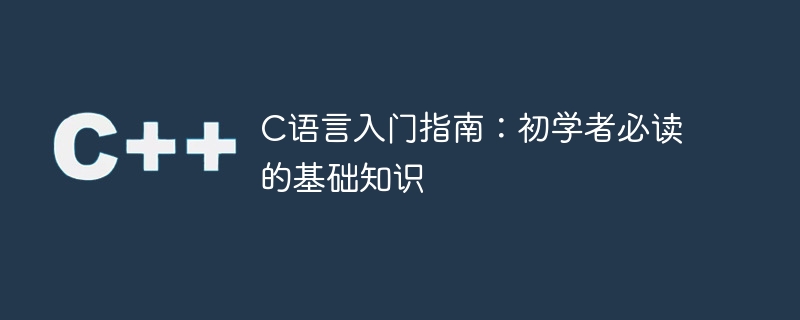
As a programming language widely used in software development and embedded system design, C language is very attractive to beginners. Learning C language can not only lay a solid foundation for further learning other high-level programming languages, but also help beginners better understand the working principle of computers. This article will introduce the basic knowledge of C language to beginners and help them get started smoothly.
- Building a programming environment:
Before starting to learn C language, we must first build a suitable programming environment. Commonly used C language integrated development environments (IDEs) include Code::Blocks, Dev-C, Visual Studio, etc. These IDEs provide visual interfaces and rich debugging tools to facilitate us in writing and debugging programs. In addition, you also need to install a C language compiler, such as GCC (GNU Compiler Collection), which converts the C code we write into machine code that the computer can execute.
- Write the first program:
To learn any new programming language, you must first write a simple "Hello World" program. This program is very simple, just output "Hello World" to the console. Through this example, we can understand the syntax and basic program structure of C language.
- Data types and variables:
There are different data types in C language, such as integers, floating point numbers, characters, strings, etc. Before using variables, we need to declare their data type and allocate memory space for them. Variable names in C language need to meet certain rules. For example, they can only be composed of letters, numbers, and underscores, and cannot start with a number.
- Operators and expressions:
C language supports various operators, such as arithmetic operators (addition, subtraction, multiplication and division), assignment operators, logical operators, etc. By using operators and expressions, we can implement a wide variety of calculations.
- Control flow:
When writing a program, we need to perform different operations according to different conditions. C language provides if-else statements and switch-case statements to implement conditional control processes. In addition, there are loop statements (such as for loops and while loops) to implement the function of repeatedly executing a certain code block.
- Arrays and pointers:
An array is a collection that stores the same type of data. The elements in the array can be accessed through subscripts. A pointer is a special variable that stores a memory address. Learning arrays and pointers is a key part of the C language and is very important for understanding memory management and program running mechanisms.
- Function:
A function is a block of code that encapsulates a specific function. The program can be divided into different modules through functions. C language provides many library functions, such as mathematical functions, string processing functions, etc. We can directly call these functions to complete specific tasks. In addition, we can also write our own functions to improve the reusability and maintainability of the code.
- File operation:
C language provides many file operation functions that can read and write files. This is useful for working with file input and output, such as reading data from a text file or saving a program's output to a file.
In addition to the above basic knowledge, beginners should also focus on practice and project application. Consolidate and apply the knowledge you have learned by writing practical programs, such as simple calculators, student performance management systems, etc. In addition, reading relevant learning materials and participating in programming discussions can also broaden your horizons and deepen your understanding.
To sum up, learning C language requires mastering basic knowledge, such as setting up a programming environment, variables and data types, operators and expressions, control flow, etc. At the same time, continuous practice and application of the knowledge learned can help beginners consolidate what they have learned and further understand the characteristics and applications of C language. I hope this beginner's guide can help you get started with C language smoothly and lay a solid foundation for future programming learning.
The above is the detailed content of Learn the basics of C: A beginner's guide. For more information, please follow other related articles on the PHP Chinese website!

